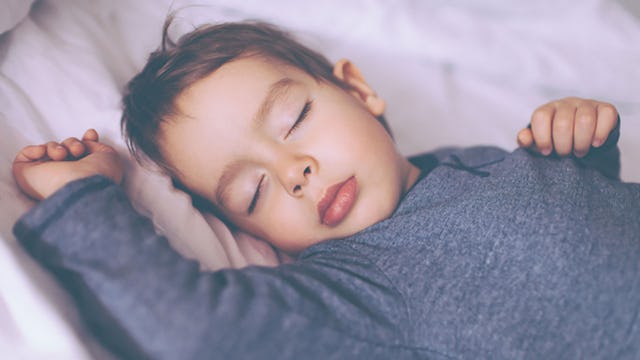This One Truth About Bedwetting Will Blow Your Exhausted Mind

Oh, hi there, I didn’t see you on the other side of these massive eye bags. I’m still recovering from changing my daughter’s wet bed sheets in the middle of the night — twice — a few weeks ago. And the night before that, same. I had thought I was done with potty training! It felt like I was trapped in a nightmare — except if it were a nightmare at least I’d be getting some actual sleep.
Then I had a chance to speak with Dr. Heather Wittenberg, child development expert and GoodNites partner, and five minutes into our conversation? She BLEW MY TIRED MIND. She had a ton of great advice about bedwetting and how to speak to your child about it, and it all comes down to this one basic truth:
You cannot train ANYONE to do something in their SLEEP.
“There is a biological process that is unique to your child that causes them to make a hormone that suppresses the volume of pee at night — and that can’t be trained or fixed,” Dr. Heather told me. And here’s the thing — bedwetting and potty training are TWO DIFFERENT THINGS.
It’s All About the ADH
The hormone children need to avoid bedwetting is called ADH (antidiuretic hormone), and kids’ bodies don’t create it on a particular timeline. “It happens when it happens,” says Dr. Heather. “When your kid’s brain decides to make that hormone and that brain development happens, boom, it’s like a switch is flipped. But before that happens, they produce a lot of urine at night.”
WHOA. It seems so obvious once you hear it, right? BUT NO ONE EVER TOLD ME.
Ditch the Mom Guilt About Bedwetting
So basically bedwetting isn’t ANYONE’S fault. “There’s a tremendous amount of mom guilt around bedwetting,” Dr. Heather says. “There’s a feeling that it’s a ‘bad sign’ of things to come, and a mom feels like they’ve done something wrong and that they’ve screwed up — because culturally we don’t talk about the truth.”
So, Now What?
The first thing I had to do was change MY mindset. Bedwetting just isn’t something my daughter can control — so I needed to stop trying to control it. But Dr. Heather assured me that there are things I can do as a mom that would help make bedwetting less of a big deal.
“In my experience as a child development expert, consistency and predictability can be good for children,” says Dr. Heather. “Especially when you add bedwetting to the equation. Adding GoodNites Nighttime Underwear to nightly routines can also help reduce stress since parents don’t need to have a conversation about bedwetting every single night — it just becomes part of the routine.”
Here’s How to Talk With Your Kid About Nighttime Wetting
We know parents aren’t likely to talk to each other about bedwetting, but what about talking to our kids? Dr. Heather offers some really concrete advice on the subject. She suggests starting with questions like: “Do you like reading a story first or taking a bath first? Do you like going to the potty right before bed, or do you like to brush your teeth last? When do you want to put on your GoodNites? What are your favorite pj’s to wear?”
I know what you’re thinking though — you’ve never been to my house and a set bedtime routine seems like a PEAK unrealistic goal. Trust me, I hear you, but some things will change, so I’ll do just about anything to ease the chaos of bedtime. I let my daughter know that it’s okay if she wets the bed at night and there are ways we can help her stay dry and comfortable. So far, this new routine has been a game changer for her sleep and my sanity.
Things Are Going to Get a Lot Drier ‘Round Here
All this is to say, I finally feel hopeful that our nighttime struggles will come to an end. After all, nothing — not even bedwetting — lasts forever. It’s not like she’s going to head to college still wetting the bed, right? RIGHT?!
Visit GoodNites.com for more tips and advice on nighttime wetting – including how to talk to your kiddos about it – cause at the end of the day, we all want our kids to wake up dry and worry-free.
This article was originally published on